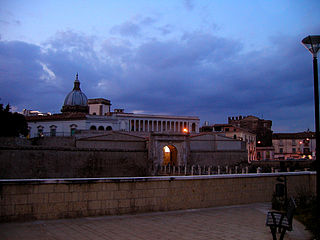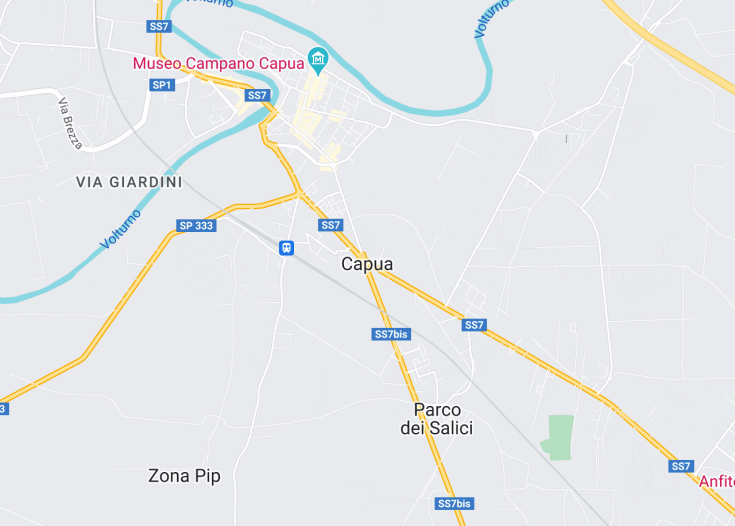Capua, an ancient city located in the Campania region of Italy, holds a significant place in history as a major center of the Roman Empire. Visitors to Capua are greeted by stunning archaeological remains, including a well-preserved Roman amphitheater and the Museum of Capua, housing numerous artifacts that narrate the region’s rich history. The city’s charm is further enhanced by its medieval architecture, quiet streets, and the scenic Volturno River that adds a picturesque quality to this historic locale.
Before venturing into Capua, ensure to plan a visit to the amphitheater early in the day to avoid the crowds and experience a more personal interaction with the ancient site.
Consider taking a guided tour to fully appreciate the historical depth and significance of Capua’s various ancient sites, which provide invaluable insights into Roman life and architecture.
Top things to do & see in Capua
Select the following sights and activities to discover best tickets and tours available in Capua.
Capua: An Ancient Gateway to History
| Country | Italy |
| Time in Capua | GMT+1 |
| Language spoken | Italian |
| Population | 18,257 (According to the latest census data) |
| Currency | Euro (€, EUR) |
| Airports |
|
Located in the Campania region of Italy, Capua is renowned for its rich historical tapestry that dates back to ancient times. Once the capital of Campania during the Roman Empire, it played a pivotal role as a major cultural and economic center. The city is famously associated with the legend of Spartacus, the gladiator who led a slave rebellion against the Roman Republic from this very place.
The city witnessed various battles, particularly during the Second Punic War, and was noted for its extensive amphitheater, second in size only to the Colosseum in Rome. Although much of its grandeur has faded with time, Capua’s architectural and archeological treasures continue to draw scholars and tourists alike. The Museo Campano, one of the oldest and richest archeological museums in Italy, hosts an array of artifacts from the Roman, pre-Roman, and Medieval periods.
Modern Capua, officially known as Santa Maria Capua Vetere, still echoes the grandiosity of its past. Its gentle landscapes, lined with historical relics, provide an evocative glimpse into the past civilizations that once thrived here. The ancient city’s layout, Roman ruins, and historical narratives invite visitors to wander through centuries of history, offering a serene yet profound experience that intertwines the ancient with the modern.
Where is Capua?
Capua is situated in the northern part of the Campania region, near the Volturno River, in southern Italy.
Distances:
(tr>Salerno to Capua65 milesApprox. 1 hour
| Route | Distance by car | Time by car |
|---|---|---|
| Rome to Capua | 136 miles | Approx. 2 hours 10 minutes |
| Naples to Capua | 28 miles | Approx. 40 minutes |
What is Capua famous for?
Capua is renowned for its ancient Roman amphitheatre, the second largest in Italy, and its historical significance as a key location in the revolt led by Spartacus against the Roman Republic.
History
Pre-Roman and Roman Period: Before 343 BC
Capua, one of the oldest cities in Italy, traces its roots back to the time before the Roman Empire when it was originally known as “Capua Vetere.” This ancient town was inhabited by the Etruscans and later the Samnites, who played significant roles in the early development of the region. Capua came under Roman control after the Samnite Wars, marking the beginning of its prominence as a major Roman city.
Roman Expansion and Aftermath: 343 BC – 476 AD
During the Roman era, Capua was the second wealthiest city in Italy, right after Rome. The city was well-known for its gladiatorial school, which is famously associated with the legendary gladiator Spartacus and his uprising in 73 BC. The fall of the Roman Empire led to a period of decline for Capua, subjecting it to invasions by the Goths and Vandals.
The Medieval Period: 476 – 1500 AD
In the medieval era, Capua experienced a resurgence under Lombard and later Norman rule. It became a fortified city and an essential ecclesiastical center. The construction of significant architectural works, including the Cathedral of Capua, began during this period. However, the city was frequently contested by warring factions, leading to turbulent times until the Renaissance.
The Modern Period: 1500 – Present
Capua’s importance continued into the modern era, although its prominence waned compared to other Italian states. During World War II, the city was heavily bombed, leading to extensive damage and loss of historical artifacts. Post-war reconstruction efforts helped restore some of its architectural heritage. Today, Capua is celebrated for its rich history and cultural significance, attracting scholars and tourists alike.
Visit Capua
Attractions and Activities
Capua, Italy, invites visitors to explore its rich historical tapestry through various attractions and activities. Notable sites include the ancient Amphitheater of Capua, one of the oldest and largest in Italy, which echoes the gladiatorial combats of ancient Rome. The Museo Campano offers insights into the local archeology and history. The medieval Cathedral of Capua and the Church of San Giovanni in Camuccini provide architectural and spiritual solace to visitors. For a leisurely day, consider a stroll through the scenic streets of the old town, soaking in the historical ambiance.
- The Amphitheater of Capua
- Museo Campano
- Cathedral of Capua
- Walking tour of historical landmarks
Festivities and Events
Capua hosts a variety of cultural and historical events throughout the year that celebrate its rich heritage. Notably, the annual “Gladiator Festival,” held in spring, reenacts the gladiatorial games in the ancient amphitheater, providing a live glimpse into Roman history. The “Medieval Days” event in autumn offers medieval games, crafts, and a historical market, ideal for families and history enthusiasts.
Best time to visit Capua
The best time to visit Capua is during the spring or early autumn. During these months, the weather is pleasantly mild, and the city hosts several cultural events that enhance the visitor experience. Avoid the hot, crowded summer months when temperatures can detract from the enjoyment of outdoor activities.
Is Capua worth visiting?
Capua is unquestionably worth visiting for its deep historical roots and well-preserved archaeological sites. The city offers a unique journey through time, from its ancient Roman days to the medieval era, making it ideal for history buffs. Additionally, the local cuisine provides a delightful exploration of traditional Italian flavors, adding to the overall cultural experience of the visit.










